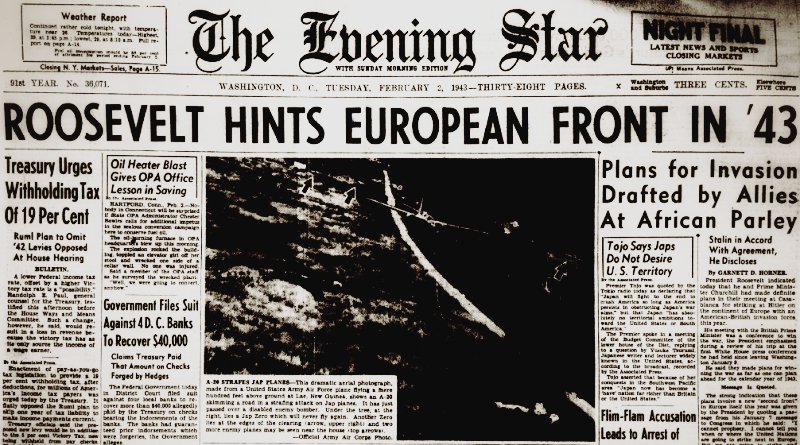World War II Chronicle: February 2, 1943
Click here for TODAY’S NEWSPAPER
Following last month’s Casablanca Conference, President Roosevelt has indicated there will be a European front this year… George Fielding Eliot column on page 10…
Sports on page 15, featuring a story about an 18-year-old Texas high school baseball player named Tom Hamilton, who is supposedly ready for the major leagues. Hamilton will play parts of two seasons for the Philadelphia A’s — in the 1950s. First comes the war, then he goes to the University of Texas, where he is an All-American first baseman and an All-Southwestern Conference baseketball player, becoming the first Longhorn to score 1,000 points…
The Chicago Cubs have acquired six-time All-Star pitcher Paul Derringer… Page 18 tells of the physical conditioning regimen for American paratroopers. The article mentions the six mile run up and down Currahee Mountain, as seen on the HBO miniseries Band of Brothers.
Roving Reporter by Ernie Pyle
WITH THE AMERICAN FORCES IN ALGERIA — I don’t know whether much has been written at home about our African booklet or not. It’s on the same principle as the booklet about England that was issued to our troops there.
The African booklet is a neat little blue-backed affair of 16 pages. It was written before we came here, and consequently is prefaced by the admission that “our welcome by the inhabitants is not known at this time.” I might add that after several months of studying the situation I still don’t know what our welcome is.
The booklet describes briefly the history and geology of the North African countries. Since it always makes a good impression for a writer to pick out flaws, I’ll take the liberty of pointing out a few small errors in our booklet.
For instance, it says “little rainfall is experienced along the coast.” Some Californian must have written that. If that stuff that comes down day after day along the Algerian coast in a piercing, chill, England-like downpour isn’t rain, then I must be shell-shocked.
When you’re wet to the skin for three days at a time and shivering with cold in mud halfway to your knees, I’m afraid you’ll have a hard time convincing several hundred thousand soldiers that it hasn’t been raining.
The booklet also says that “mirage is of fairly frequent occurrence. It generally occurs early in the morning.” It may be there are mirages here in the summertime, I don’t know. But the only mirage anybody has seen around here this winter would be one induced by approximately four bottles of cheap wine.
The booklet explains the new issue of American money given us. It adds that there will be little to buy over here (and they are right), and advises soldiers to allot at least 75 per cent of their pay home.
There is so little to spend money on over here that everybody has more than he knows what to do with. Officer-friends of mine say they have never saved so much money in their lives. As for me, I’m spending a total of about $5 a week. (My employers will probably try to keep me here forever when they read this.)
Being a financial ignoramus from way back, it’s all Greek to me why we issued this American money to begin with. For the French money still exists — both currencies are acceptable — and now that the newness has worn off, the Army is paying off in Francs anyhow. The British issued a special money for their troops too. It’s all too deep for me.
The most interesting part of the book is its “Do’s and Don’ts.” It warns us never to enter mosques, and never to loiter, smoke or spit in front of a mosque.
It says that bread is holy to the Moslems, and never to cut it but always break with the fingers, and not to let any drop on the ground.
It says further that you must always eat with your right hand, even if you are a southpaw. I asked a French Algerian about this and he says he never heard of it before. So I’ve continued to eat left- handed and nothing has happened.
The booklet warns us not to give Moslems alcoholic drinks, not to bring dogs into the house, and not to kill snakes or birds, since the Arabs believe that the souls of the departed chieftains reside in them.
Finally the book says, “Talk Arabic if you can to the people. No matter how badly you do it, they like it.”
This is good advice in any country, but how any American is to go about trying to talk Arabic is more than I know. Most of us can’t even learn enough French to get by, and Arabic is an almost impossible language to learn.
The Army has put out a few little booklets giving some Arabic words and phrases. I’ll give you an example of how easy it is to speak Arabic.
For instance if an Arab asks you what that thing is hanging from your belt, you reply “bundikeeya sughayaara” — which means pistol.
After you’d talked and hour or two along that line and were ready to call it a day, you’d say to the Arab, “Lailtak syeede ataimsik behair.” That means “good night.”
This book ends by saying that some Arabic sounds are almost impossible for Americans to learn. For example, it says that “kh” resembles the sound made when clearing the throat, and that “gh” is a deep gargling noise.
If you were to sneeze, cough, whistle, choke and hiccup all at once, that would mean “I love you baby, meet me in front of Walgreen’s right after supper, and leave your veil at home.”
Evening star. (Washington, D.C.), 2 February 1943. Chronicling America: Historic American Newspapers. Lib. of Congress.
https://chroniclingamerica.loc.gov/lccn/sn83045462/1943-02-02/ed-1/
